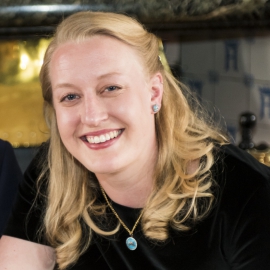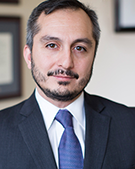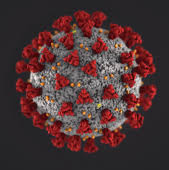Historical Perspectives On Contemporary Issues
Series: Perspectives on the COVID-19 Pandemic (12 episodes)
|
Listen to international perspectives on the history of epidemics and public health crises around the world; the intersection of COVID-19 with issues of race, gender, and economic status; and the broader consequences of pandemics throughout society. After listening, be sure to explore the "Resources" section with further reading and information for researchers. |
-
Vassiliki Betty Smocovitis provides us with an introduction to the history and evolution of infectious disease.
-
Nancy Tomes reflects on the experience of being a historian of medicine during the COVID-19 epidemic, and interdisciplinary efforts to respond to the outbreak.
-
Kathryn Olivarius recounts how epidemics have exacerbated social and economical inequalities.
-
Dora Vargha talks about the role of international institutions during a pandemic.
-
Elena Conis examines how we use history, especially of the polio epidemics, when we discuss the COVID-19 pandemic.
-
Cindy Connolly, Patricia D'Antonio, and Julie Fairman discuss the role of nurses and the nursing profession in the history of pandemics.
-
Natalia Molina discusses the intersection of race and public health during the COVID-19 crisis and other pandemics.
-
Catherine Burns explores the COVID-19 crisis in South Africa in the context of the history of HIV/AIDS.
-
Amir Afkhami discusses the history of epidemic disease in Iran, including the current crisis.
-
Mary Augusta Brazelton talks about the COVID-19 crisis along with the history of public health and modernization in China.
-
Marcos Cueto discusses the COVID-19 crisis in Brazil.
-
Kavita Sivaramakrishnan reflects on public engagement, political history, and the COVID-19 crisis in India.

Vassiliki Betty Smocovitis
University of Florida
Betty Smocovitis is Professor of History of Science in the Departments of Biology and History. She studies the history, philosophy and social study of the twentieth century biological sciences, especially evolutionary biology, systematics, ecology and genetics. She also studies the history of the botanical sciences in America. Her publications include Unifying Biology: The Evolutionary Synthesis and Evolutionary Biology (Princeton University Press, 1996); with Daniel J. Crawford, editors, The Scientific Papers of G. Ledyard Stebbins, Jr. (1929-1930) (A. R. G. Gantner Verlag, 2004); and with Victoria Hollowell and Eileen Duggan, editors, The Ladyslipper and I by G. Ledyard Stebbins. (Missouri Botanical Garden Press, 2007).
Betty provides us with an introduction to the history and evolution of infectious disease. Recorded April 14, 2020.

Nancy Tomes
Stony Brook University
Nancy Tomes is Distinguished Professor of History at Stony Brook University, specializing in the social and cultural history of medicine and gender. Her publications include: A Generous Confidence: Thomas Story Kirkbride and the Art of Asylum Keeping (Cambridge, 1984; paperback, Penn, 1994), Madness in America: Cultural and Medical Perceptions of Mental Illness Before 1914, with Lynn Gamwell (Cornell, 1995), The Gospel of Germs: Men, Women and the Microbe in American Life (Harvard, 1998), and Remaking the American Patient: How Madison Avenue and Modern Medicine Turned Patients into Consumers (UNC, 2016).

Kathryn Olivarius
Stanford University
Kathryn Olivarius is Assistant Professor in the Department of History at Stanford University, focusing on the history of nineteenth-century America, primarily the antebellum South, Greater Caribbean, slavery, and disease. Her research seeks to understand how epidemic yellow fever disrupted Deep Southern society. By fusing health with capitalism in her forthcoming book Immunocapital, she presents a new model—beyond the toxic fusion of white supremacy with the flows of global capitalism—for how power operated in Atlantic society.
Kathryn recounts how epidemics have exacerbated social and economical inequalities. Recorded May 4, 2020.

Dora Vargha
University of Exeter
Dora Vargha is Senior Lecturer in Medical Humanities. She is the author of Polio across the Iron Curtain: Hungary's Cold War with an Epidemic (Cambridge University Press, 2018).

Elena Conis
University of California, Berkeley
Elena Conis is Associate Professor in the Graduate School of Journalism at UC, Berkeley, and is a historian of medicine, public health, and the environment. Her publications include Vaccine Nation: America’s Changing Relationship with Immunization (University of Chicago Press, 2014).

Julie Fairman, Patricia D'Antonio, Cindy Connolly
University of Pennsylvania
Julie Fairman is the Nightingale Professor in Honor of Nursing Veterans, Chair, Biobehavioral Health Sciences Department, University of Pennsylvania School of Nursing. Patricia D'Antonio is the Carol Ware Professor of Mental Health and the Director of the Barbara Bates Center for the Study of the History of Nursing. Cindy Connolly is the Rosemarie B. Greco Endowed Term Chair in Advocacy at the University of Pennsylvania School of Nursing.
Cindy, Patricia, and Julie discuss the role of nurses and the nursing profession in the history of pandemics. Recorded May 13, 2020
Natalia Molina
University of Southern California
Natalia Molina is Professor of American Studies and Ethnicity, History, Latinx Studies, Immigration, Gender, Urban Studies, and Public Health. Her first book, Fit to be Citizens? Public Health and Race in Los Angeles, 1879-1939, explores the ways in which race is constructed relationally and regionally. In that work, she argues that race must be understood comparatively in order to see how the laws, practices, and attitudes directed at one racial group affected others. Fit to Be Citizens? demonstrates how both science and public health shaped the meaning of race in the early twentieth century. Her second book, How Race Is Made in America: Immigration, Citizenship, and the Historical Power of Racial Scripts, examines Mexican immigration–from 1924 when immigration acts drastically reduced immigration to the U.S. to 1965 when many quotas were abolished–to understand how broad themes of race and citizenship are constructed. These years shaped the emergence of what she describes as an immigration regime that defined the racial categories that continue to influence perceptions in the U.S. about Mexican Americans, race, and ethnicity.
Natalia discusses the intersection of race and public health during the COVID-19 crisis and other pandemics. Recorded May 1, 2020

Catherine Burns
Wits Institute for Social and Economic Research
Catherine Burns is Associate Professor of Medical History at University of the Witwatersrand. Her research interests focus on medical and health history, the history and ethnography of reproduction and sex, ethics in biomedical research, and the history of gender in southern Africa. She is the editor of African Studies, an internationally-rated interdisciplinary journal, and is a convener of the Medical Humanities in Africa group. Catherine is completing the biography of a herbalist and midwife who lived and practised in South Africa from 1880 to 1940.
Catherine explores the COVID-19 crisis in South Africa in the context of the history of HIV/AIDS and the legacies of apartheid. Recorded June 15, 2020.

Amir Afkhami
George Washington University
Amir Afkhami holds a joint appointment in the Departments of Psychiatry and Behavior Sciences and the Department of Global Health at the George Washington University School of Medicine and Health Sciences. He is the Associate Director of psychiatry residency training. His publications include A Modern Contagion: Imperialism and Public Health in Iran’s Age of Cholera (Johns Hopkins, 2019).
Amir discusses the history of epidemic disease in Iran, including the current crisis. Recorded June 10, 2020.

Mary Augusta Brazelton
University of Cambridge
Mary Brazelton is University Lecturer in Global Studies of Science, Technology and Medicine in the Department of History and Philosophy of Science at the University of Cambridge. Her first book, Mass Vaccination: Citizens' Bodies and State Power in Modern China, examines the history of mass immunization in twentieth-century China. It suggests that the origins of the vaccination policies that eradicated smallpox and controlled other infectious diseases in the 1950s, providing an important basis for the emergence of Chinese health policy as a model for global health, can be traced to research and development in southwest China during the Second Sino-Japanese War. Her research interests lie broadly in historical intersections of science, technology, and medicine in China and around the world.
Mary discusses the COVID-19 crisis along with the history of public health and modernization in China. Recorded June 10, 2020.

Marcos Cueto
Fundação Oswaldo Cruz, Casa de Oswaldo Cruz
Marcos Cueto is a historian of science and medicine who has worked on Latin America and international health. His recent work includes a book coauthored with Ted Brown and Elizabeth Fee on the history of the World Health Organization. His research interests are the global history of health (rather than the history of global health) and the history of HIV/AIDS in Brazil.
Marcos discusses the COVID-19 crisis in Brazil. Recorded June 9, 2020.

Kavita Sivaramakrishnan
Columbia University
Kavita Sivaramakrishnan is Associate Professor, Sociomedical Sciences at Columbia University and studied at St Stephens College, Delhi; Trinity College, University of Cambridge and completed her Ph.D at the Center for Historical Studies, Jawaharlal Nehru University. She is a scholar focused on global public health history and South Asian history, with interests in the history of epidemics, local publics and disease politics. Her most recent research is on the cultural politics of aging in the global South, and on histories of chronic disease and toxic risks in India. She is the author of As the World Ages: The Making of a Demographic Crisis (Harvard, 2018). She is currently researching the reframing of vocabularies of risks during influenza pandemics in the 1950's-2000 in India, and the making of South Asia and Asia as sites of disease and infection.
Kavita reflects on public engagement, political history, and the COVID-19 crisis in India. Recorded June 30, 2020.
Insights from the Collections
The Consortium's collections provide many opportunities to learn more about the history of epidemic disease.
Our cross-institutional search tool allows researchers to investigate materials across multiple institutions from a single interface. With more than 4.4 million catalog records of rare books and manuscripts, the Consortium's search hub offers scholars and the public the ability to identify and locate relevant materials.
Search the Consortium search hub.
Some archival materials related to this topic include:
Simon Flexner Papers, American Philosophical Society
Rufus Ivory Cole Papers, American Philosophical Society
Joseph Stokes, Jr. Papers, American Philosophical Society
Records of the International Health Board/International Health Division, Rockefeller Archive Center
Project Files FA386A, FA386B, FA387A, FA387B [Grant Records on yellow fever, malaria, influenza, tuberculosis, etc.], Rockefeller Archive Center
Purnell W. Choppin Papers, Rockefeller Archive Center
Learning from SARS, New York Academy of Medicine
Other Web resources:
Philadelphia Pandemic Preparedness Project from the College of Physicians of Philadelphia
Medicine and Madison Avenue from Nancy Tomes and the Duke University Library's Special Collections
Learn more about our speakers:
Amir Afkhami
Mary Augusta Brazelton
Catherine Burns
Elena Conis
Cindy Connolly
Marcos Cueto
Patricia D'Antonio
Julie Fairman
Natalia Molina
Kathryn Olivarius
Kavita Sivaramakrishnan
Vassiliki Betty Smocovitis
Nancy Tomes
Dora Vargha
Related publications from our speakers:
A Modern Contagion: Imperialism and Public Health in Iran's Age of Cholera, by Amir Afkhami; Johns Hopkins, 2019
A Useable Past: The Search for History in Chords, by Catherine Burns; Nordik Afrika Institute, 2008
Louisa Mvemve: A "Little Woman's" Advice to the Public, by Catherine Burns; Feminist Press, 2003
Vaccine Nation: America's Changing Relationship with Immunization, by Elena Conis; Chicago, 2015
Children and Drug Safety: Balancing Risk and Protection in Twentieth Century America, by Cynthia Connolly; Rutgers, 2018
Saving Sickly Children: The Tuberculosis Preventorium in American Life, 1909-1970, by Cynthia Connolly; Rutgers, 2008
American Nursing: A History of Knowledge, Authority, and the Meaning of Work, by Patricia D'Antonio; Johns Hopkins, 2010
Nursing with a Message: Public Health in New York City, 1920-1940, by Patricia D'Antonio; Rutgers, 2017
Making Room in the Clinic: A History of the Nurse Practitioner Movement, by Julie Fairman; Rutgers, 2009
Fit to Be Citizens?: Public Health and Race in Los Angeles, 1879-1939, by Natalia Molina; California, 2006
How Race Is Made in America: Immigration, Citizenship, and the Historical Power of Racial Scripts, by Natalia Molina; California, 2014
Relational Formations of Race Theory, Method, and Practice, edited by Natalia Molina, Daniel Martinez HoSang, Ramón A. Gutiérrez; California, 2019
Unifying Biology: The Evolutionary Synthesis and Evolutionary Biology, by Vassiliki Betty Smocovitis; Princeton, 1996
The Scientific Papers of G. Ledyard Stebbins, Jr. (1929-1930). Edited and with an Historical Introduction, edited by Vassiliki Betty Smocovitis and Daniel J. Crawford; A. R. G. Gantner Verlag, 2004
The Ladyslipper and I by G. Ledyard Stebbins, edited by Victoria Hollowell, Vassiliki Betty Smocovitis, and Eileen Duggan; Missouri Botanical Garden, 2007
The Art of Asylum-Keeping: Thomas Story Kirkbride and the Origins of American Psychiatry, by Nancy Tomes; Cambridge, 1984; paperback, Pennsylvania, 1994
Madness in America: Cultural and Medical Perceptions of Mental Illness Before 1914, by Nancy Tomes and Lynn Gamwell; Cornell, 1995
The Gospel of Germs: Men, Women and the Microbe in American Life, by Nancy Tomes; Harvard, 1998
Remaking the American Patient: How Madison Avenue and Modern Medicine Turned Patients into Consumers, by Nancy Tomes; North Carolina, 2016
Polio across the Iron Curtain: Hungary's Cold War with an Epidemic, by Dora Vargha; Cambridge, 2018
See also recent work from our fellows:
Epidemic Preparedness in the Age of Chronic Illness: Public Health and Welfare in the United States, 1965-2000, George Aumoithe
Unspeakable Loss, Distempered Awakenings: North America's Invisible Throat Distemper Epidemic of 1735-1765, Nicholas Bonneau
The Disease of Commerce: Yellow Fever in the Atlantic World, 1793-1805, Julia Mansfield
Medicine Within Borders: India’s Response to COVID-19, Vivek Neelakantan
Related forums:
Trust in Science: Vaccines
Sickness and the City
 This series of discussions by scholars in the humanities and social sciences explores a variety of issues related to the COVID-19 pandemic.
This series of discussions by scholars in the humanities and social sciences explores a variety of issues related to the COVID-19 pandemic. 